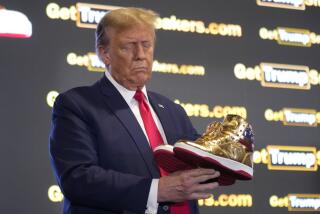COLUMN LEFT / ALEXANDER COCKBURN : Bill Clinton, Puppy Dog of Neoliberalism : For those who think the free-trade agreement is disastrous, Perot is the man.
- Share via
It’s really too bad that Ross Perot has such deplorable, regressive ideas for wiping out the deficit. In the final debate in Michigan, the jug-eared little billionaire was first-rate when he made his entirely apt remarks about the North American Free Trade Agreement and was properly rewarded with a surge in the polls.
To the evident embarrassment and confusion of his two opponents, Perot said the agreement would lower wages and debauch the environment. For about five minutes, in front of a huge audience, “bipartisanship,” as represented by Bush and Clinton, was revealed for what it is. And for that achievement (along with bringing up other forbidden topics such as the impending bank crisis, Manuel Noriega, April Glaspie and the origins of the war with Iraq) Perot deserves our thanks. If I were a worker in one of those states where all the jobs are about to be sucked south, I’d probably pull the lever for him.
Counseled by friends of mature judgment, I have tried to like Clinton. It’s impossible. Listening to him is like having a pillow stuffed into one’s mouth. He just can’t stop talking.
There is something dog-like about Clinton, smacked on the muzzle, always coming back for more. Woof. Woof. Paws up on your chest, desperate for a word of approval, tail going thump against the ottoman. Even when he’s making a relative amount of sense, as he did in the third debate when he attacked speedy deficit reduction and Perot’s salvation-through-pain, he goes on too long.
Never once, in three debates, did Clinton permit the word justice to pass his lips. Never once, in my hearing, did he disturb the airwaves with expressions of concern about the poor, the hungry, the homeless, the nonwhite and--for 99% of his alloted time--the non-male.
Clinton is the ultimate distillation of neoliberalism. He thinks of human liberation as asset management. Asked about poor education or lousy health care, he speaks of “competitiveness,” never about how such blights constrain people from living happier lives. Asked about the debt crisis in Third World countries, he says it is a problem because it “has lessened their capacity to buy American goods and probably cost us 1.5 million jobs.”
The other day in my garage I tripped over an old box of files. Out spilled Jimmy Carter’s position statements from 1976. I sat down and leafed through them. How the political atmosphere has changed, for the worse. Although he hadn’t the slightest intention of fulfilling such pledges, Carter felt it necessary to promise to break up the oil companies and find a Federal Reserve chairman in tune with his economic proposals, which mainly revolved around full employment. Carter blew it, but next to Clinton he stood out as a man with some core of moral and political principles. For Clinton, everything is negotiable.
With Clinton, it all boils down to that dreadful phrase, “investing in people,” as in “investing in people, challenging the private sector to organize in new ways to increase productivity by putting business and labor, education and government on the same side, and making an intense commitment to be competitive in the global economy.” This particular slab of Clintonspeak was served up at the Economic Club of Detroit last August, but he says the same sort of thing 10 times a day.
Cap’n Bushy was awful in the debates. Maybe it’s the thyroid thing. The President always was dumb about economics. His last chance to jump-start the economy came in March of this year, when the Democrats offered him a deal: a renewed investment tax credit and lowered capital gains taxes in return for a tax increase for some upper-income groups. (This, incidentally, is pretty much Clinton’s plan.) But with Federal Reserve Chairman Alan Greenspan at his elbow, getting everything wrong, Bush declined to vex the rich and so missed out on his last chance to have some growth by November.
If Clinton makes it to the White House, he won’t have much time. Capital is already threatening to go on strike. After his refusal to indulge in tub thumping about the deficit, Wall Street reacted swiftly. By Oct. 21, the Wall Street Journal was announcing that “bond prices fell sharply again on a growing belief that Clinton will win the election and step up spending to aid the economy.”
If you are going to panic capital, you have to fight capital. If you don’t, you’ll capitulate soon enough. Should Clinton win and go forward with the meager $20-billion stimulus his plan calls for, then the economy won’t revive and Wall Street will have him by the throat. His only chance would be to order, in the first hundred days, a big stimulus of $100 billion or so. If not, it will be too late and he’ll end up in the same mess as Carter did, and we’ll be back to Republicans for another 12 years.
More to Read
Sign up for Essential California
The most important California stories and recommendations in your inbox every morning.
You may occasionally receive promotional content from the Los Angeles Times.













